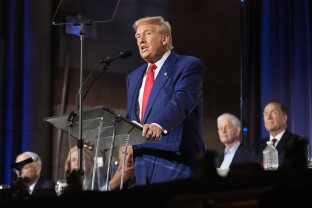As former President Donald Trump unveiled five pillars of a second-term economic plan on Thursday, one of his proposals seemed to garner more attention than any other: a vow to appoint Elon Musk the head of a new commission on government efficiency.
Speaking to The Economic Club of New York, the former president offered up his usual doom and gloom about the current economy, blaming Vice President Kamala Harris for rising inflation and the surge in illegal immigration.
“I will create a government efficiency commission tasked with conducting a complete financial and performance audit of the entire federal government and making recommendations for drastic reforms,” Trump said, noting that the commission came “at the suggestion of Elon Musk, who has given me his complete and total endorsement.”
